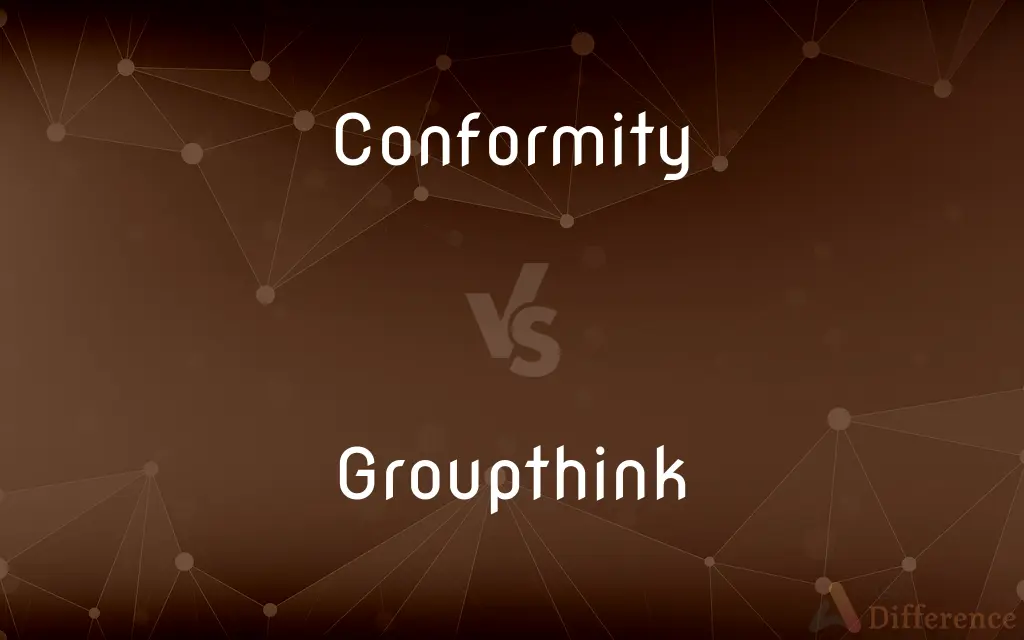Conformity vs. Groupthink — What's the Difference?
By Urooj Arif & Maham Liaqat — Updated on April 29, 2024
Conformity involves the act of matching attitudes and behaviors to group norms, while groupthink refers to flawed decision-making within a group due to the desire for harmony.

Difference Between Conformity and Groupthink
Table of Contents
ADVERTISEMENT
Key Differences
Conformity is characterized by individuals adapting their behaviors, beliefs, or attitudes to align with those of a larger group, often influenced by perceived social norms or the desire for acceptance. Whereas groupthink describes a situation where the cohesion and desire for unanimity in a group lead to poor decision-making processes, as members suppress dissenting opinions and critical thinking to maintain harmony.
Conformity can occur in any group setting as individuals often feel pressured to fit in, which can influence their choices and actions. On the other hand, groupthink is specifically a dynamic that tends to occur in more tightly-knit groups where the stakes of group unity are perceived as high, often resulting in irrational or dysfunctional decision-making outcomes.
While conformity might not always negatively impact decision-making and can sometimes lead to positive outcomes by fostering order and predictability, groupthink is generally viewed negatively because it involves compromising one's own judgment for the sake of consensus. This can lead to suboptimal decisions that might not be in the best interest of the group or its goals.
The mechanisms driving conformity include both normative influence (desire to fit in) and informational influence (desire to be correct), whereas groupthink primarily arises from a strong conformity pressure within a cohesive group, often exacerbated by isolation from outside opinions.
In terms of outcomes, conformity can lead to uniformity that supports societal or organizational function, while the outcomes of groupthink are often flawed or irrational decisions that can result in inefficiency or disaster, highlighting the potential dangers of overly cohesive group dynamics.
ADVERTISEMENT
Comparison Chart
Definition
Adjustment of behavior to match group norms.
Decision-making process prioritizing harmony over critical evaluation.
Social Context
Can occur in any social setting.
Often occurs in cohesive, isolated groups.
Influences
Normative and informational influences.
Strong pressure to conform for group cohesion.
Typical Outcomes
Can be positive or negative, leading to order or peer pressure.
Often leads to poor decisions and inefficiency.
Psychological Basis
Desire for acceptance or accuracy.
Desire to maintain group harmony and minimize conflict.
Compare with Definitions
Conformity
Conforming involves a change in behavior influenced by real or imagined group pressure.
Conformity in teenagers can often be attributed to peer pressure.
Groupthink
A collective mindset that prioritizes consensus over realistic appraisal of alternatives.
Groupthink during meetings often results in overlooked objections.
Conformity
Compliance with standards or rules.
Conformity to safety protocols is essential in construction.
Groupthink
The lack of individual creativity or responsibility, often leading to irrational decisions.
Groupthink led them to invest in a flawed business plan.
Conformity
A behavior adjustment to fit into a social environment.
She conformed to the new culture by learning the local language.
Groupthink
A psychological phenomenon where people strive for consensus within a group.
The disastrous policy was a result of groupthink, as no one voiced opposition.
Conformity
The tendency to act similarly to others in a group.
Conformity in fashion trends is often driven by celebrity endorsements.
Groupthink
The practice of thinking or making decisions as a group in a way that discourages creativity.
Groupthink stifled innovation at the company, leading to a lack of new ideas.
Conformity
The act of matching attitudes and behaviors to group norms.
He wore a suit to the interview to conform to the company's dress code.
Groupthink
A group's desire for harmony that results in an irrational or dysfunctional decision-making outcome.
Their decision to forego market research was born from groupthink.
Conformity
Conformity is the act of matching attitudes, beliefs, and behaviors to group norms, politics or being like-minded. Norms are implicit, specific rules, shared by a group of individuals, that guide their interactions with others.
Groupthink
Groupthink is a psychological phenomenon that occurs within a group of people in which the desire for harmony or conformity in the group results in an irrational or dysfunctional decision-making outcome. Cohesiveness, or the desire for cohesiveness, in a group may produce a tendency among its members to agree at all costs.
Conformity
Similarity in form or character; agreement
I acted in conformity with my principles.
Groupthink
The act or practice of reasoning or decision-making by a group, especially when characterized by uncritical acceptance or conformity to prevailing points of view.
Conformity
Action or behavior in correspondence with socially accepted standards, conventions, rules, or laws
Conformity to university regulations.
Groupthink
A process of reasoning or decision-making by a group, especially one characterized by uncritical acceptance of or conformity to a perceived majority view.
Conformity
The relationship between rock or sediment strata that were deposited adjacently or vertically in sequence without any interruption due to erosion, tilting, folding, or similar natural processes.
Groupthink
Decision making by a group (especially in a manner that discourages creativity or individual responsibility)
Conformity
A surface exhibiting such a relationship between older rock strata and younger rock strata.
Conformity
The state of things being similar or identical.
Conformity
A point of resemblance; a similarity.
Conformity
The state of being conforming, of complying with a set of rules, with a norm or standard.
Conformity
The ideology of adhering to one standard or social uniformity.
Conformity
Correspondence in form, manner, or character; resemblance; agreement; congruity; - followed by to, with, or between.
By our conformity to God.
The end of all religion is but to draw us to a conformity with God.
A conformity between the mental taste and the sensitive taste.
Conformity
Compliance with the usages of the Established Church.
The king [James I.] soon afterward put forth a proclamation requiring all ecclesiastical and civil officers to do their duty by enforcing conformity.
Conformity
Correspondence in form or appearance
Conformity
Acting according to certain accepted standards
Conformity
Orthodoxy in thoughts and belief
Conformity
Concurrence of opinion;
We are in accord with your proposal
Conformity
Hardened conventionality
Common Curiosities
What are the dangers of groupthink in decision-making?
Groupthink can lead to poor decisions as critical thinking is compromised for the sake of harmony.
What is groupthink?
Groupthink is a psychological phenomenon where the desire for group consensus results in irrational or poor decision-making.
How can one prevent groupthink in a team setting?
Encouraging open dialogue, welcoming dissent, and involving outside opinions can help prevent groupthink.
What is conformity?
Conformity is the behavior of matching one's actions or beliefs to the group norms.
How does groupthink differ from peer pressure?
Groupthink specifically involves decision-making processes in a group, while peer pressure involves influencing an individual's behavior.
Can conformity be positive?
Yes, conformity can lead to positive outcomes by fostering social order and predictability.
What psychological factors contribute to groupthink?
Factors include the desire for harmony and fear of disrupting group unity.
What are examples of groupthink in history?
Examples include policy failures or corporate disasters where critical objections were suppressed.
Why might groupthink be particularly prevalent in tight-knit groups?
Tight-knit groups often have stronger desires for harmony and unity, which can suppress dissent.
How does conformity affect individual behavior?
Conformity can lead individuals to change their behaviors or beliefs to align with those of a group.
Is groupthink always negative?
Groupthink tends to be negative as it often leads to flawed decisions, but it can also foster quick consensus in urgent situations.
How can leaders reduce conformity in organizations?
Promoting a culture that values individuality and critical thinking can reduce harmful conformity.
What measures can help in identifying groupthink in its early stages?
Awareness of the signs, such as limited debate or rapid consensus, can help in identifying and addressing groupthink early.
What role does culture play in conformity?
Culture significantly influences what behaviors or norms individuals are likely to conform to.
Can conformity lead to negative outcomes?
Yes, when conformity pressures lead individuals to engage in harmful or unethical actions.
Share Your Discovery

Previous Comparison
Hotel vs. Pension
Next Comparison
Responsibility vs. RemitAuthor Spotlight
Written by
Urooj ArifUrooj is a skilled content writer at Ask Difference, known for her exceptional ability to simplify complex topics into engaging and informative content. With a passion for research and a flair for clear, concise writing, she consistently delivers articles that resonate with our diverse audience.
Co-written by
Maham Liaqat












































